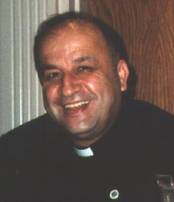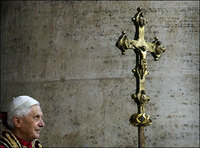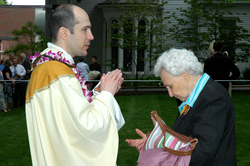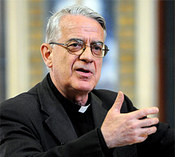The Holy See has put in one spot on their webpage the numerous documents concerning the abuse of minors, and the Church’s response. Check it out. The documentation given here is crucial in understanding how the Church thinks and acts pastorally in view of sexual abuse of minors.
Conventual Franciscans meet in Chapter, prayers please
You may be wondering why I am asking you to send up some prayers for the Conventual Franciscans. This week two east coast Conventual Franciscan provinces are meeting in a provincial chapter to discuss matters pertaining to their life as Franciscans. A chapter meets every four years. This week the two provinces on the east coast of the USA are deciding by vote the merger of their provinces, no insignificant matter. May the Holy Spirit guide and protect the discussions!
Yousif Habash as new bishop for Syrian Catholics elected
 The Holy Father consented to the election of Chor-bishop Yousif (Joseph) Habash, pastor of the Church of the Sacred Heart of Jesus (Los Angeles) as 2nd bishop of the Eparchy of Our Lady of Deliverance (Newark) by the Patriarch and bishops of the Syrian Catholic Church.
The Holy Father consented to the election of Chor-bishop Yousif (Joseph) Habash, pastor of the Church of the Sacred Heart of Jesus (Los Angeles) as 2nd bishop of the Eparchy of Our Lady of Deliverance (Newark) by the Patriarch and bishops of the Syrian Catholic Church.
Vatican Information Service’s blog
The Vatican Information Service has initiated its own blog. VIS has a daily bulletin of news and the blog format makes it easier to see what’s happening at the Church’s center. See the VIS blog here.
Lombardi’s statement on clergy sex abuse
This past Friday (April 9) Jesuit Father Federico Lombardi, director
of the Vatican press office, spoke about the sexual abuse of minors. Remembering
that Father Lombardi is only the press director for the Vatican and not someone
who sets policy, this statement fine. It evokes some questions and it opens
conversation, in my opinion. I think it is necessary to read the address in its entirety because there are a number of points made therein that were not mentioned –no surprise– in the secular media. This is his statement as published by Vatican
Radio.
The debate concerning sexual abuse, and not only that committed by the
clergy, continues with news items and comments of various kinds. How can we
sail through these stormy waters while maintaining a secure course and
responding to the evangelical motto ‘Duc in altum’ — Put out into the deep?
In the first place, by continuing to seek truth, and peace
for the victims. One of the most striking things is that today so many inner
wounds are coming to light, wounds that also date to many years (sometimes
decades) ago, but evidently still open. Many victims do not seek financial
compensation but inner assistance, a judgment on their painful individual
experiences. There is something that we have yet to fully understand; perhaps
we need a more profound experience of events that have had such a negative
impact on the lives of individuals, of the Church and of society. One example
of this, at the collective level, is the hatred and violence of conflicts
between peoples which are, as we see, so difficult to overcome in true
reconciliation. Abuse opens wounds at a deep inner level. For this reason,
certain episcopates were right when they courageously resumed developing ways
and places in which victims could express themselves freely, listening to them
without taking it for granted that the problem had already been faced and
overcome by the workshops established sometime ago. For this reason also, other
episcopates and individual bishops were right to intervene paternally, showing
spiritual, liturgical and human concern for victims. It seems certain that the
number of new accusations of abuse is falling, as is happening in the United
States, but for many people the road to profound healing is only now beginning,
and for others it has yet to start. In the context of this concern for victims,
the Pope has written of his readiness to hold new meetings with then, thus
sharing in the journey of the entire ecclesial community. But this journey, in
order to achieve profound effects, must take place in respect for people and
the search for peace.
Alongside concern for victims we must continue to
implement, decisively and truthfully, the correct procedures for the canonical
judgment of the guilty, and for collaborating with the civil authorities in
matters concerning their judicial and penal competencies, taking the specific
norms and situations of the various countries into account. Only in this way
can we hope effectively to rebuild a climate of justice and complete trust in
the ecclesiastical institution. It has happened that a number of leaders of
communities and institutions, through inexperience or unpreparedness, have not
had a ready understanding of the protocols and criteria for intervention which
could have helped them intervene decisively even when this was very difficult or
painful for them, also because they were often surprised by the accusations.
But, while civil law intervenes through general norms, canon law must take
account of the specific moral gravity of an abuse of the trust placed in
persons who hold positions of responsibility within the ecclesial community,
and of the flagrant contradiction with the conduct they should show. In this
sense, transparency and rigour are urgent requirements if the Church is to bear
witness to wise and just government.
The formation and selection of candidates
for the priesthood, and more generally of the staff of educational and pastoral
institutions, is the basis for an effective prevention of the risk of future
abuses. Achieving a healthy maturity of the personality, also from a sexual
point of view, has always been a difficult challenge, but today it is
particularly so, although the best psychological and medical knowledge is of
great help in spiritual and moral formation. It has been observed that the
greatest frequency of abuses coincided with the most intense period of the
‘sexual revolution’ of past decades. Formation must take account of this
context and of the more general context of secularisation. In the final
analysis, this means rediscovering and reaffirming the sense and importance of
sexuality, chastity and emotional relationships in today’s world, and doing so
in concrete, not just verbal or abstract, terms. What a source of disorder and
suffering their violation or undervaluation can be! As the Pope observed in his
Letter to Irish Catholics, a Christian priestly life today can respond to the
requirements of its vocation only by truly nourishing itself at the wellspring
of faith and friendship with Christ.
People who love truth and the objective
evaluation of problems will know where to seek and find information for a more
overall comprehension of the problem of paedophilia and the sexual abuse of
minors in our time, in different countries, understanding its range and
pervasiveness. Thus they will be able to achieve a better understanding of the
degree to which the Catholic Church shares problems that are not only her own,
to what extent they have particular gravity for her and require specific
interventions, and, finally, the extent to which the experience the Church is going
through in this field may also be useful for other institutions or for society
as a whole. In this context, we truly feel that the communications media have
not yet worked sufficiently, especially in countries in which the Church has a
stronger presence and in which she is more easily subject to criticism. Yet,
documents such as the national U.S. report on the mistreatment of children
deserve to be better known in order to understand what fields require urgent
social intervention, and the proportions of the problem. In the U.S.A. in 2008
alone, 62,000 people were identified as having committed acts of abuse against
minors, while the proportion of Catholic priests was so small as not to be
taken into consideration as a group.
The protection of minors and young people
is, then, an immense and unlimited field, which goes well beyond the specific
problem concerning certain members of the clergy. People who sensitively,
generously and attentively dedicate their efforts to this problem deserve
gratitude, respect and encouragement from everyone, especially from the
ecclesial and civil authorities. Theirs is an essential contribution for the
serenity and credibility of the education and formation of young people, both
inside and outside the Church. The Pope rightly expressed words of great
appreciation for them in his Letter to Irish Catholics, though naturally with a
view to a vaster horizon.
Finally, Pope Benedict XVI, a coherent guide along
the path of rigour and truth, merits all respect and support, testimony of
which is reaching him from all parts of the Church. He is a pastor well capable
of facing — with great rectitude and confidence — this difficult time in
which there is no lack of criticism and unfounded insinuations. It must be said
that he is a Pope who has spoken a lot about the Truth of God and about respect
for truth; and he has become a credible witness of this. We accompany him,
learning from him the constancy necessary to grow in truth and transparency,
continuing to open our horizons to the serious problems of the world and
responding patiently to the slow and gradual release of partial or presumed
‘revelations’ which seek to undermine his credibility, and that of other
institutions or individuals of the Church.
This patient and solid love of truth
is necessary, in the Church, in the society in which we live, in communicating
and in writing, if we wish to serve rather than confuse our fellow men and
women.
Novena of Prayer for Pope Benedict
 The Knights of Columbus has begun a novena of prayer for Pope Benedict XVI beginning today, Divine Mercy Sunday, April 11, and ending on Monday, April 19, the anniversary of election as Supreme Pontiff. 2010 is the 5th anniversary of the Pope’s election.
The Knights of Columbus has begun a novena of prayer for Pope Benedict XVI beginning today, Divine Mercy Sunday, April 11, and ending on Monday, April 19, the anniversary of election as Supreme Pontiff. 2010 is the 5th anniversary of the Pope’s election.
Divine Mercy Sunday
In every age the Lord wants his mercy to be known to us. Over time you have no doubt noticed the Lord revealing Himself through the works of various saints: Saints Gertrude, Mechtilde, Margaret Mary Alocoque, Claude la Colmbiere, Fautina, and Blessed Francisco de los Hoyos. Most often the call to recognize divine Mercy has come in the devotion to the Sacred Heart of Jesus which we ordinarily devote the month of June to. Today is the fruit of Saint Faustina’s mission to make known Jesus’ invitation to enter into His heart.
Praying for priests as an act of Mercy
 O my Jesus, I beg you on behalf of the whole Church:
O my Jesus, I beg you on behalf of the whole Church:
Grant it love and the light of the your Spirit, and give power to the words of
priests so that hardened hearts might be brought to repentance and return to
you, O Lord.
holiness. O Divine and Great High Priest, may the power of your mercy
accompany them everywhere and protect them from the devil’s traps and snares
which are continually being set for the souls of priests. May the power
of your mercy, O Lord, shatter and bring to naught all that might tarnish the
sanctity of priests, for you can do all things. Amen.
Low Sunday or Quasimodo Sunday or Dominica in albis depositis
The Second Sunday of Easter has many names, as noted
in the title of this post. In some places the theme of mercy is recognized drawing us into the Lord’s bountiful mercy: John Paul II recommended the title of Divine Mercy Sunday for this day, too. The most accurate title, however, for today, is “Quasimodo
Sunday” taken from the first two words of the entrance Antiphon at Mass
that speak especially to those baptized at the Easter Vigil: Quasi modo geniti infantes, rationabile, sine dolo lac concupiscite ut in eo
crescatis in salutem si gustastis quoniam dulcis Dominus. (As newborn babes,
alleluia, desire the rational milk without guile, alleluia, alleluia, alleluia.
Rejoice to God our helper. Sing aloud to the God of Jacob (1 Peter 2:2).)
second Sunday following Easter is the day on which the newly baptized
officially put away their white robes, it is therefore known liturgically as
“Dominica in albis depositis” or the “Sunday of putting away the
albs.”
attention on the doubts of Saint Thomas at hearing the news of the risen
Christ.
risen Jesus gave an additional proof that he wished the Sunday to be,
henceforth, the privileged day. He reserved the second visit he intended to pay
to all his disciples for this the eighth day since his Resurrection. During the
previous days, he has left Thomas a prey to doubt; but to-day he shows himself
to this Apostle, as well as to the others, and obliges him, by irresistible
evidence, to lay aside his incredulity. Thus does our Saviour again honour the
Sunday. The Holy Ghost will come down from heaven upon this same day of the
week, making it the commencement of the Christian Church: Pentecost will
complete the glory of this favoured day.”



